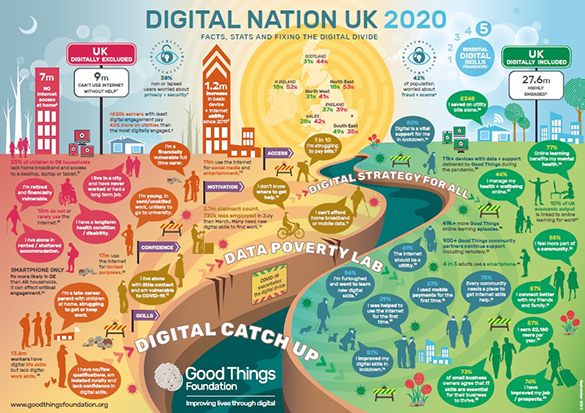
The Greater Manchester Combined Authority (GMCA) will push to become a 100% digitally enabled region, after research by the University of Liverpool revealed that as many as 1.2 million residents remain digitally excluded.
The GMCA is forming a new Digital Inclusion Taskforce made up senior leaders, industry, community groups and local government after research led by the University's Professor Simeon Yates revealed the huge divide in access to digital that exists within the region.
The work, which was commissioned by social change charity, Good Things Foundation, revealed that over 700,000 people in Greater Manchester are only using the internet in a narrow or limited way, with a further 450,000 classified as 'non-users.'
Professor Simeon Yates, in the University's Department of Communication and Media, said: "Covid has brought issues of digital exclusion and inequality to the fore. But digital exclusion is not a new phenomenon. Exclusion from access to technology and information has been noted since the 1970's.
"The shift of both public and private services, systems and even everyday leisure online means that the combination of digital inequality with other aspects of social, economic and cultural inequality can have significant impacts on citizens lives.
"Importantly, digital exclusion and inequalities are not just about a lack of access to broadband (though access is the starting point), but also levels of access, skills, and education, cost and often networks of support.
"It is not just about material resources to use 'digital' or access 'digital spaces', but the social, cultural and economic capital to 'be digital' and 'space to be digital'. A situation that Covid and lockdown measures have extensively highlighted.
"Working with the Good Things Foundation we have drawn on the Ofcom data on Adults' Media Use and Attitudes to track this 'digital divide' over time. Unfortunately elements of this divide stubbornly remain."
The Greater Manchester Digital Inclusion Taskforce, which is due to meet for the first-time next week, aims to address the barriers of digital exclusion and the digital divide, in a co-ordinated and focussed way, informed by local needs and sharing learning, resource and expertise.
Councillor Sean Fielding, GMCA Lead for Employment, Skills and Digital said "I'm proud to announce our intention that Greater Manchester be a 100% digitally enabled city-region, a region that puts people at the heart of our plans.
"Access to the digital world should be a basic human right, everyone in Greater Manchester whatever their age, location, or situation, should be able to benefit from the opportunity's digital brings."
Digital inclusion is a prominent objective in Greater Manchester's Living with COVID-19 Resilience Plan as the region sets to address the challenges of rebuilding economic resilience in a challenging climate, ensuring that residents are at the heart of the region's recovery.
Greater Manchester senior leaders are calling on anyone who has a stake in digital inclusion or benefits from people being online to get involved in the Taskforce and help in addressing barriers like connectivity, accessibility, affordability, skills, motivation and confidence.






